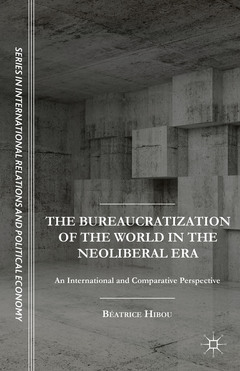Description
The Bureaucratization of the World in the Neoliberal Era, 2015
An International and Comparative Perspective
The Sciences Po Series in International Relations and Political Economy Series
Author: Hibou B.
Language: English
Subject for The Bureaucratization of the World in the Neoliberal Era:
Support: Print on demand
Description
/li>Contents
/li>Biography
/li>
Béatrice Hibou is director of research of the CNRS at CERI-SciencesPo, Paris, France. Her comparative research in political economy focuses, from a Weberian perspective and a foucaldian conception of power, on the political significance of economic reform, on state trajectories and on the exercise of domination, based on cases from sub-Saharan Africa, the Maghreb and Europe. Her most important publications include Anatomie Politique de la Domination (2011), The Force of Obedience, Political Economy of Repression in Tunisia (2011); ed. Privatising the State (2004).
These books may interest you

The Political Anatomy of Domination 126.59 €

The Political Anatomy of Domination 126.59 €


